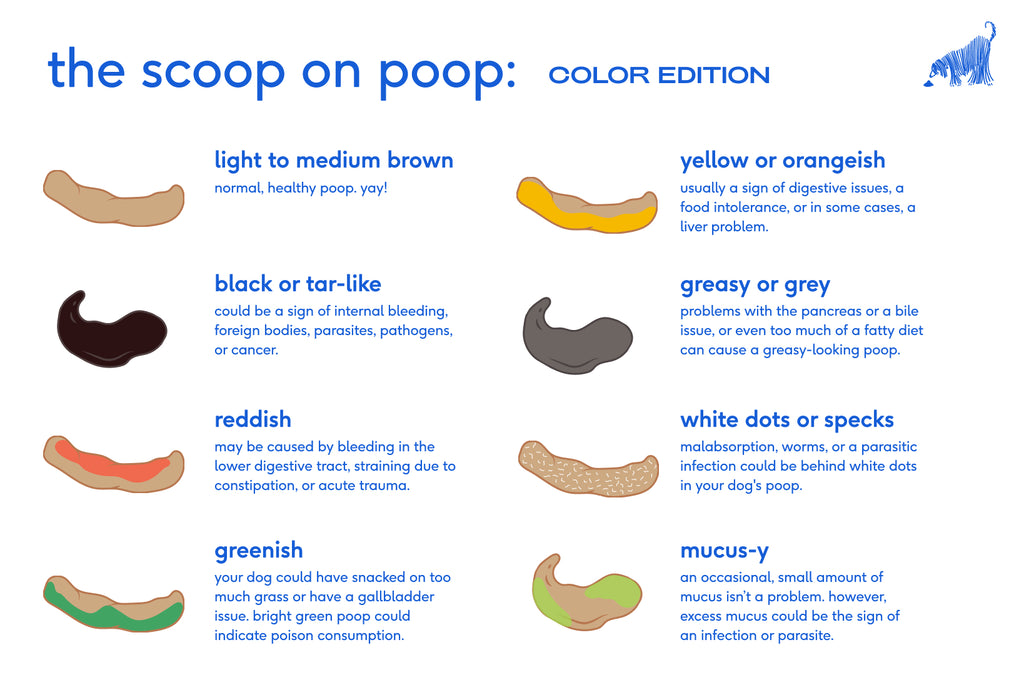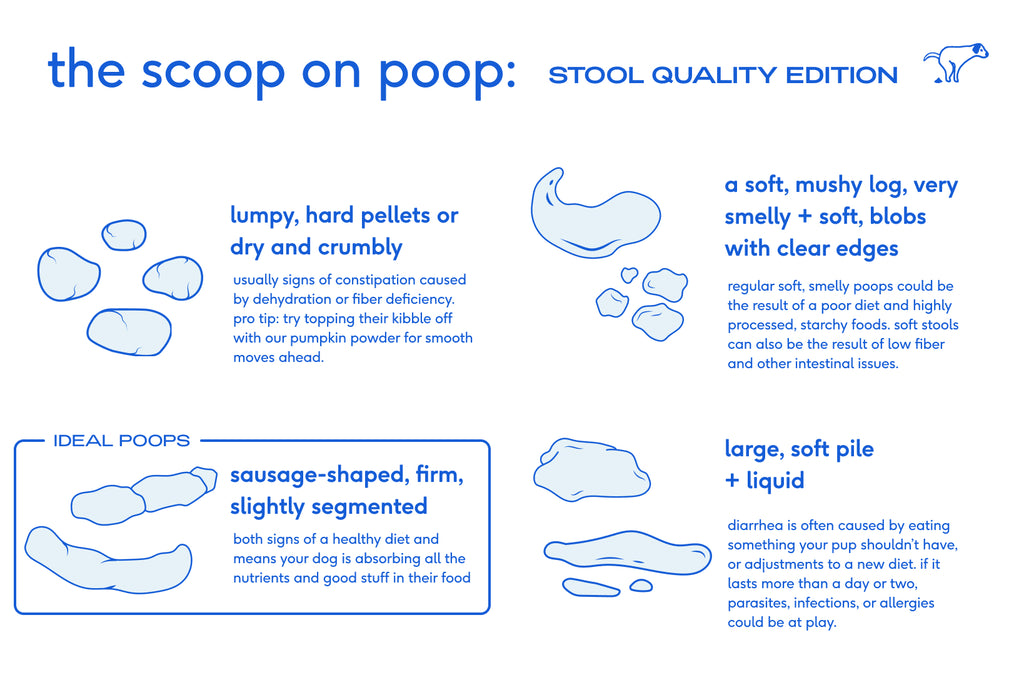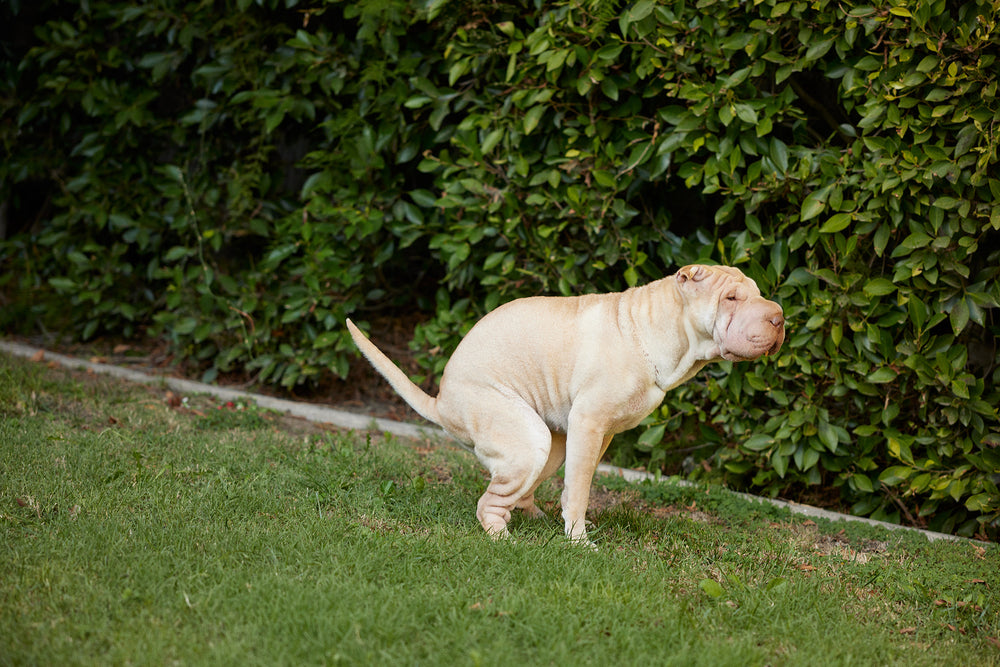By: Dr. Juli, DVM @itsDrJuli
Daily walks, playtime, meal time, and potty time are all activities that are an essential part of responsible dog ownership. Dogs have unique ways of communicating, and many dog parents can set the clock by their pup's meal time and poop time. Dogs, like people, thrive on a consistent routine, which also decreases stress and allows pet owners to better determine if their pup is experiencing a problem. For example, if your dog has never missed a meal and suddenly refuses to eat, this may indicate an underlying health concern.
One of the easiest ways to evaluate your pet's health is by observing the health of their bowel movements. Veterinarians commonly request poop samples during your dog's examination because stool quality, consistency, color, and frequency provide information on digestive health. Observing your dog's daily bowel movements is a helpful way to monitor your four-legged friend's health.

So, what should your dog's poop look like? Numerous factors determine the health of your dog's stools and the frequency of bowel movements. For most dogs, bowel movement frequency and amount will correspond with the number and size of their daily meals. As a general rule, your dog's poop should be firm but not hard, light to dark brown, formed, and segmented when passed.
Veterinarians will use a scoring chart to evaluate your dog's stool health.


Bowel movement health is valuable when assessing your dog's overall health and wellness. You can take numerous steps at home to decrease the chances of your dog suffering from digestive problems, so follow these seven tips for healthy dog bowel movements.
#1: Feed your dog proper portions of a complete and balanced diet
Ensure to feed your dog an AAFCO-approved diet for their age, breed, health, and lifestyle. As your dog ages, their nutritional requirements will change, so it is critical to provide them with proper nutrients to support their aging organs and joints. AAFCO diets ensure that your dog receives the required vitamins, minerals, and nutrients for optimal organ function appropriate for their life stage. Generally, if your dog is fed a complete and balanced diet, they will not require additional supplements. However, dogs who suffer from underlying medical issues or who are genetically prone to certain conditions, like arthritis, can benefit from an added joint supplement, like Native Pet Relief Chews.
Food portion size is also a critical component of your dog's overall health, including digestive and poop health. Although food is a love language for many pet parents, overfeeding can lead to obesity and gastrointestinal (GI) problems, including vomiting, diarrhea, or bloat, which can be deadly. Commercial dog food diets provide feeding guidelines based on your dog's ideal weight. However, other factors, including activity level, appetite, and health status, should be considered when portioning out your dog's daily diet. Additionally, your pup's daily treat allotment should be at most 10% of their daily calories.
Conversely, underfeeding your dog can lead to them being malnourished, which compromises their overall immune system health. It will also decrease the health and frequency of their stools. Consult with your veterinarian to ensure you feed your pup the right amount and type of food.
#2: Provide ample fresh and clean water
More than 60% of your dog's body is water, so ensure they always have access to fresh, clean water. Water is required for all bodily functions, including proper organ function, brain health, blood circulation, and digestion. For picky dogs or those who don't drink enough, pouring water on their kibble or supplementing their diet with bone broth can help support their hydration needs. Dehydration can be deadly, so active dogs or those in warmer climates may require more water than others.
Dehydration can also lead to painful constipation. Straining during defecation attempts or hard stools may indicate your dog is dehydrated. Bring your pup for a veterinary exam if your dog shows dehydration signs, including lethargy, diarrhea, vomiting, straining or absent bowel movements, excess panting, or dry, sticky gums.
#3: Avoid table scraps and slowly introduce new foods or treats
Although sharing everything with your pup is tempting, feeding table scraps, especially rich, fatty foods, can negatively affect digestive health. Rich, fatty foods are especially difficult for dogs to digest and can lead to GI problems, including loose stools, diarrhea, or pancreatitis in severe cases, which is a potentially deadly inflammatory condition.
Additionally, slowly introduce any new dog-safe food or treats to ensure your pup's GI system can tolerate the new ingredients. Sudden changes in your dog's diet can affect their digestive health and disrupt the gentle balance of their gut microbiome. Providing your dog with a probiotic, like Native Pet Probiotic Powder, during diet transitions or when introducing a new treat can help them maintain healthy gut bacterial balance and decrease the chances of GI problems.

#4: Provide regular exercise
Regular exercise is essential for your dog's mental and physical well-being and aids in healthy bowel movements. Daily physical activity will help your pup maintain healthy circulation while stimulating movement within the GI tract. Aim to work your pup up to 30 minutes of physical activity each day. This can be achieved in multiple shorter play sessions or a longer walk or run. Also, slowly introduce activities into your dog's routine to prevent them from becoming injured. Your dog can be a great fitness accountability partner. Always check with your veterinarian to ensure they are healthy enough to participate in certain activities, like running.
#5: Add fiber when necessary
If dumpster diving or counter surfing for table scraps are a favorite activity for your pup, they have likely experienced loose stools or diarrhea at some point. Fiber supplements, like Pumpkin, can aid in digestion and help to firm stools. Fiber supplementation can also support regular bowel movements if your dog is not eating enough in their diet or is a picky eater.
#6: Provide a consistent daily routine and minimize stress
Like people, your dog thrives on a consistent routine, including feeding, activity, and sleep schedules. Sudden changes in their environment, including new people, smells, or locations, can be stressful. Stress can lead to inflammation within the GI tract, which can cause changes in your dog's stools. Slowly introducing changes into your dog's daily routine can help minimize the chances of them suffering from stress-related diarrhea or colitis. Anxious or noise-averse dogs have an increased risk for stress colitis. Ensure to provide your dog with a safe space before a potentially stressful event, like fireworks. Additionally, providing them with a calming supplement before an anticipated stressful event can help reduce their stress and decrease their chances of developing loose stools.

#7: Bring your dog for regular veterinary checkups
Yearly or more frequent veterinary checkups will ensure your dog remains healthy from the inside out. Your veterinarian will perform a nose-to-tail exam to check for noticeable health ailments. Yearly blood, urine, and stool tests also provide valuable information on your dog's organ and digestive health. Additionally, vaccinations against common and potentially deadly dog infections, like parvovirus, will decrease the chances of your dog becoming sick. If your dog enjoys walks outside or playdates with canine friends, they have an increased risk for intestinal parasites like giardia or tapeworms. Parasites can lead to dehydration and diarrhea, as well as malnutrition. Giving your dog regular veterinary-prescribed parasite prevention will ensure they are protected.
Your dog's poop quality and frequency provide valuable information on the overall health and regularly monitoring your dog's stool is an easy tool to check your pet's GI health.
For more information and tips on your dog's health, check out the Native Pet blog.


